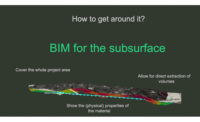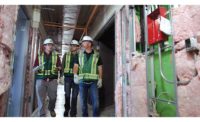Bringing artificial intelligence to asphalt compaction

SENSING Neural-network computer controls allow for better road compaction during roadbuilding activities.
Photo Courtesy Volvo Construction Equipment
Proper asphalt compaction is the key to ensuring the life of roads, and finding new ways to measure that compaction is seen as the key to improving infrastructure construction. To extend the life of the nation’s roads, the U.S. Dept. of Transportation has made “intelligent compaction” a priority.
 |
| Sesh Commuri |
Vibratory roller compactors had been outfitted with GPS and multiple sensors to measure ambient conditions, but there was no way to measure the density of the asphalt during compaction.
Dr. Sesh Commuri has spent over 13 years working on machine-control systems and artificial intelligence for the compaction process. The result is the Intelligent Asphalt Compaction Analyzer, a neural network-based computer system that can “learn” what proper compaction “feels like” on a tested area of the asphalt. The anaylzer uses this information as a guide as the compactor goes over the rest of the road.
![]() In his work as a professor at the University of Oklahoma, Norman, and working with the Okla. Dept. of Transportation, Commuri has brought cutting-edge artificial-intelligence research to road construction. Now, working with Volvo Construction Equipment, Commuri’s technology is found in Density Direct, the first commercially available intelligent compaction system driven by neural networks. Commuri is continuing his work on advancing embedded control systems in his new role as technical director at the Advanced Autonomous Systems Innovation Center at the University of Nevada, Reno. Already, Volvo has begun to sell compactors with the asphalt-compaction machine controls, and a similar system for more intelligent soil compaction is also nearing completion.
In his work as a professor at the University of Oklahoma, Norman, and working with the Okla. Dept. of Transportation, Commuri has brought cutting-edge artificial-intelligence research to road construction. Now, working with Volvo Construction Equipment, Commuri’s technology is found in Density Direct, the first commercially available intelligent compaction system driven by neural networks. Commuri is continuing his work on advancing embedded control systems in his new role as technical director at the Advanced Autonomous Systems Innovation Center at the University of Nevada, Reno. Already, Volvo has begun to sell compactors with the asphalt-compaction machine controls, and a similar system for more intelligent soil compaction is also nearing completion.




